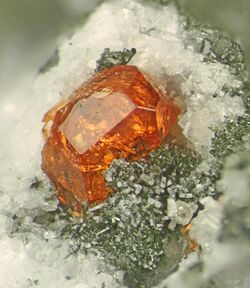Chemistry:Khomyakovite
| Khomyakovite | |
|---|---|
 | |
| General | |
| Category | Silicate mineral, cyclosilicate |
| Formula (repeating unit) | Na 12Sr 3Ca 6Fe 3Zr 3W(Si 25O 73)(O,OH,H 2O) 3(OH,Cl) 2 (original form) |
| Strunz classification | 9.CO.10 (10 ed) 8/E.23-30 (8 ed) |
| Dana classification | 64.1.2.5 |
| Crystal system | Trigonal |
| Crystal class | Ditrigonal pyramidal (3m) H-M symbol: (3m) |
| Space group | R3m |
| Unit cell | a = 14.30, c = 30.08 [Å] (approximated); Z = 3 |
| Identification | |
| Color | Orange to orange-red |
| Crystal habit | Aggregates (anhedral to subhedral) |
| Cleavage | None |
| Fracture | Uneven |
| Tenacity | Brittle |
| Mohs scale hardness | 5–6 |
| |re|er}} | Vitreous |
| Streak | White |
| Diaphaneity | Transparent to translucent |
| Density | 3.14 (calculated) |
| Optical properties | Uniaxial (−) |
| Refractive index | nω = 1.63, nε = 1.63 (approximated) |
| Pleochroism | None |
| References | [1][2] |
Khomyakovite is an exceedingly rare mineral of the eudialyte group, with formula Na
12Sr
3Ca
6Fe
3Zr
3W(Si
25O
73)(O,OH,H
2O)
3(OH,Cl)
2.[1][2] The original formula was extended to show the presence of both the cyclic silicate groups and M4-site silicon, according to the nomenclature of the eudialyte group.[4] Some niobium substitutes for tungsten in khomyakovite. Khomyakovite is an iron-analogue of manganokhomyakovite, the second mineral being a bit more common.[2] The two minerals are the only group representatives, beside taseqite, with species-defining strontium, although many other members display strontium diadochy. Khomyakovite is the third eudialyte-group mineral with essential tungsten (after johnsenite-(Ce) and manganokhomyakovite).[1]
Occurrence and association
Khomyakovite, manganokhomyakovite, johnsenite-(Ce) and oneillite are four eudialyte-group minerals with type locality in Mont Saint-Hilaire, Quebec, Canada.[5] Khomyakovite itself is associated with analcime, annite, natrolite, titanite, calcite, and pyrite.[2]
Notes on chemistry
Impurities in khomyakovite include niobium, potassium and manganese, with minor rare earth elements, magnesium, titanium, hafnium and aluminium.[2]
References
- ↑ 1.0 1.1 1.2 Mindat, Khomyakovite, http://www.mindat.org/min-7137.html
- ↑ 2.0 2.1 2.2 2.3 2.4 Johnsen, O., Gault, R.A., Grice, J.D., and Ercit, T.S., 1999: Khomyakovite and manganokhomyakovite, two new members of the eudialyte group from Mont Saint-Hilaire, Quebec, Canada. The Canadian Mineralogist 37, 893–899
- ↑ Warr, L.N. (2021). "IMA–CNMNC approved mineral symbols". Mineralogical Magazine 85 (3): 291–320. doi:10.1180/mgm.2021.43. Bibcode: 2021MinM...85..291W.
- ↑ Johnsen, O., Ferraris, G., Gault, R.A., Grice, D.G., Kampf, A.R., and Pekov, I.V., 2003. The nomenclature of eudialyte-group minerals. The Canadian Mineralogist 41, 785–794
- ↑ "Poudrette quarry (Demix quarry; Uni-Mix quarry; Desourdy quarry; Carrière Mont Saint-Hilaire), Mont Saint-Hilaire, La Vallée-du-Richelieu RCM, Montérégie, Québec, Canada - Mindat.org". http://www.mindat.org/loc-599.html. Retrieved 2016-03-11.
 |
